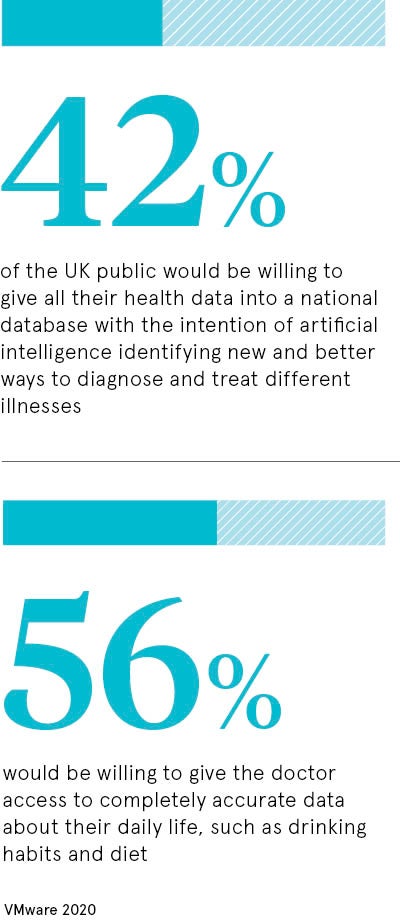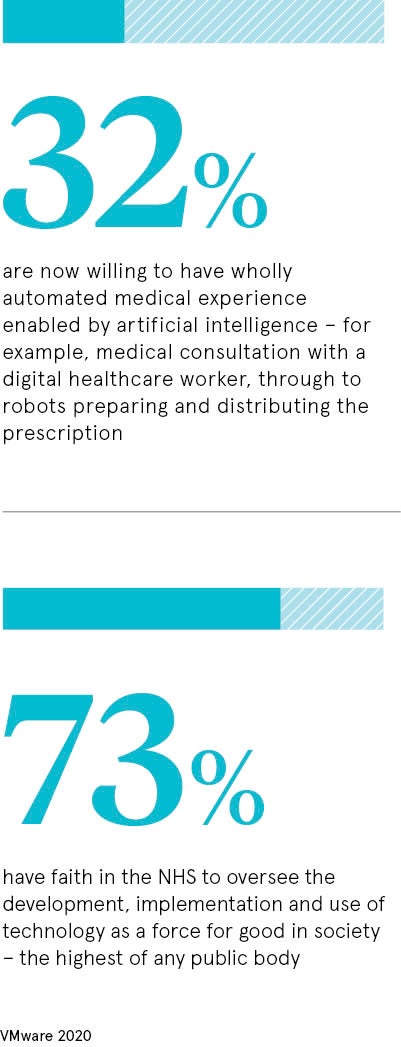Scientists have warned there could be thousands of excess deaths in the UK in the coming years due to delays in cancer diagnosis and treatment during by the coronavirus crisis.
The pandemic has meant routine screenings, and urgent referrals and treatments, have been delayed or cancelled, leading to a backlog of patients. Researchers at the Health Data Research Hub for Cancer examined data from eight hospital trusts and found that, in a worst-case scenario, if delays continue, there could be up to 35,000 additional cancer deaths within a year.
But artificial intelligence (AI) could be a solution. Over the past decade, AI has emerged as a leading technology with the potential to aid the medical community, from speeding up diagnostics and improving accuracy to improving patient outcomes and hospital efficiencies.
Diagnosis benefits from AI in cancer care
One challenge in oncology is early diagnosis. The NHS is good at cancer treatment, but the disease is not always detected early enough and this could be exacerbated by COVID-19. AI in cancer care could help find innovative ways to reach individuals faster and identify early signs of cancer. 
“There’s interest in how we might be able to use AI alongside personal data devices people have, such as Fitbits,” says Dr Jodie Moffat, head of early diagnosis at Cancer Research UK. “These might be able to signal when things are changing sooner than might otherwise have been detected. That’s going to help you to identify people who might need some follow up or who are at risk in some way.”
AI can be used to help diagnose different types of cancer, such as breast, prostate or skin cancer. John Loder, investment director for Nesta, an innovation foundation, cites Skin Analytics, a healthcare company that is working with clinicians in dermatology and using AI to deliver better patient outcomes. “Dermatology is a leading example because it’s an understaffed area and a common cancer,” he says.
AI can diagnose more in less time
Data visualisation and machine-learning techniques can also help extract clinically useful knowledge from a huge amount of data. Researchers at the Institute of Cancer Research have developed a large-scale AI database to aid drug discovery research. It brings together data across biology, chemistry, pharmacology, structural biology, cellular networks and clinical annotations.
“With this we were able to start developing AI technology that would allow us to answer key questions. For example, to come up with a risk profile for different patients,” says Professor Bissan Al-Lazikani, head of data science at the Institute of Cancer Research.
A study, published in Nature journal in January, found AI is more accurate than doctors in diagnosing breast cancer from mammograms. Currently in cancer screening in the NHS, two radiologists must analyse each woman’s X-rays.
Researchers from Google Health and Imperial College London tested a computer model on nearly 29,000 women and showed it to be as effective as human radiologists. The AI model was as good as the current double-reading system of two doctors and was better at spotting cancer than a single doctor, they found.
Dr Hutan Ashrafian, one of the lead researchers and an AI expert at Imperial College London, says AI can be particularly helpful in supporting diagnostics. “It’s a low hanging fruit for AI at the moment, particularly in supporting radiological diagnostics because the data you get is digital,” he says.
AI can improve efficiency in cancer centres
Before AI can be used in a clinical setting, it needs to be trialled and evaluated properly. At the moment, researchers at Google Health and Imperial are organising trials across the country to see if they can replicate their results.
If the results are positive, the AI algorithm could save a lot of time and support healthcare resources. “What we found was quite powerful,” says Ashrafian. “In one fell swoop, it could reduce the NHS workload on a national level.”
AI is supportive and works alongside people. I don’t see it ever replacing doctors.
It might not be as glamorous, but clinicians say AI in cancer care could be particularly useful in improving hospital administrative efficiency. For example, AI-based tools could help manage appointments, look after patient pathways and track patients.
Dr Caroline Rubin, vice president for clinical radiology at the Royal College of Radiologists, says: “It can really help to make the system flow more efficiently. It’s hugely important that patients don’t get lost in systems. It’s not something that is currently hugely efficient. It’s also quite labour intensive.”
Obstacles to implementing AI in cancer care
Rubin says it’s not so much reluctance to adopt new technologies that may have slowed developments down so far, but the need for proper testing, safety and regulations to ensure technology is safe and as effective and efficient as possible.
It’s also essential that any new technology fits easily within a hospital setting. “How they are embedded in workflow is hugely important,” Rubin adds. “We can’t have something that slows us down; it has to be efficient and supportive.” Patient consent must also be considered, as well as ensuring data is kept safely within the NHS.
The Care Quality Commission recently released a report into deep-learning in diagnostic and screening services. A key finding was that “more clarity [is needed] on how hospitals should implement machine-learning devices within clinical pathways to ensure high-quality care”.
There is a massive acceleration and we’re going to end up in a place where use of AI is a natural part of medicine
Where there is reluctance, it could be that implementing AI technologies can be expensive, requiring funding and investment. From the point of view of public perception, people trust doctors and some may be wary of machines. “But AI is supportive and works alongside people,” says Rubin. “I don’t see it ever replacing doctors.”
Covid-19 and cancer care
Ashrafian adds: “The pandemic has catapulted the need for digital.” Tech can facilitate remote practice as with AI tools there’s no need for people to visit hospitals where they could be exposed to COVID-19.
“The way I see it, we are absolutely at the inflection point,” says Al-Lazikani at the Institute of Cancer Research. “There is a massive acceleration in this and we’re going to end up in a place where use of AI is a natural part of medicine.”
Diagnosis benefits from AI in cancer care

AI can diagnose more in less time


